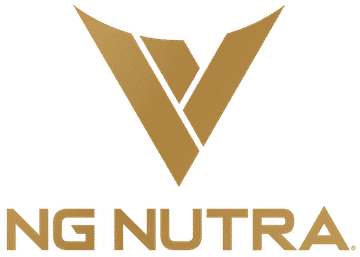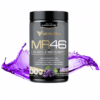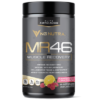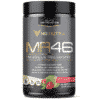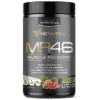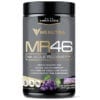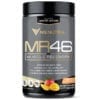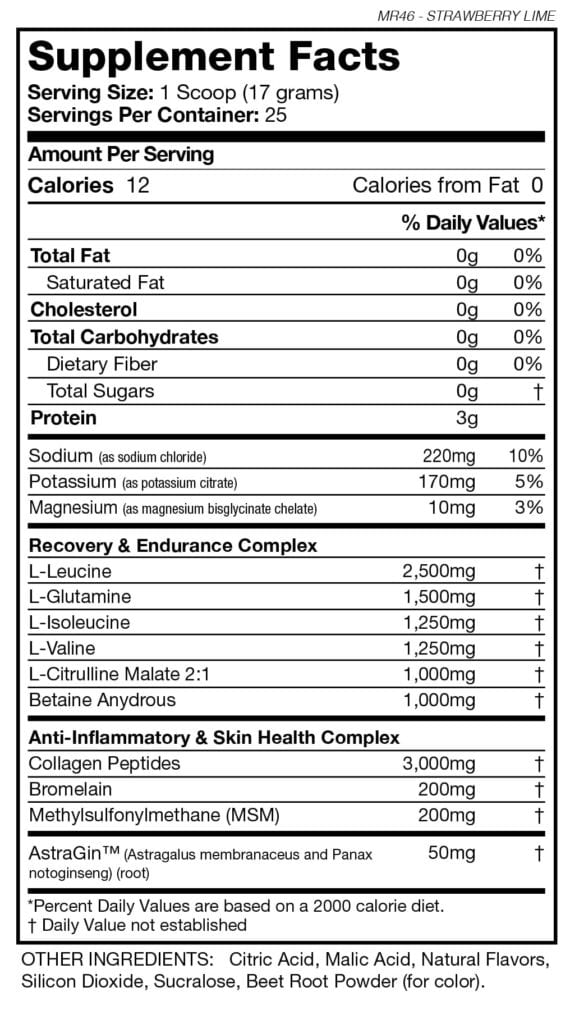MR46 – Muscle Recovery
$54.99 — or 10% off: $54.99 $49.49 / month
Free Shipping Over $75

What is MR46?
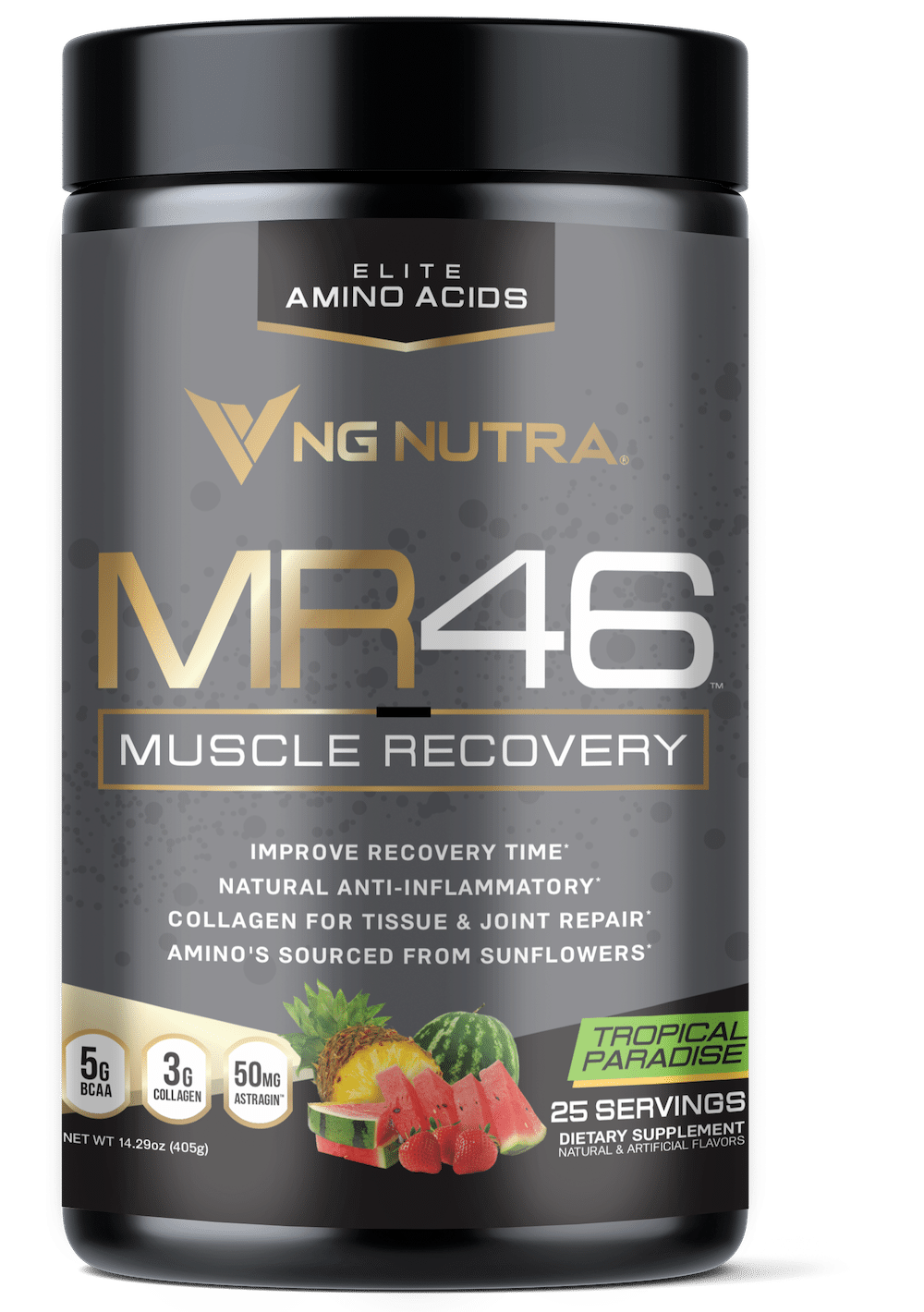


Why We Developed MR46
We also noticed a lot of post-workouts were missing certain ingredients that we feel are very important for adequate recovery in various aspects of our bodies. Our muscles need to be repaired, however, so do our tendons, and ligaments as well as our hydration levels. We researched and created the perfect blend of ingredients for the ultimate repair of the whole body.

Let’s break this down to see how MR46 works in the body.
Our muscle tissue comprises several components, of those components, roughly 20% of the muscle tissue comes from protein. Protein = Amino Acids bound together.
When we drink a protein shake or eat some sort of meat, our bodies take that protein and break it down into amino acids. Then, the amino acids can be utilized by our bodies for various purposes. In the scenario we are discussing, amino acids are used to recover muscle tissue from strenuous exercise or a strenuous day of hard work.
Depending on the type of protein we consume (protein shake or meat), it typically takes anywhere from 1 hour to 6 hours or so to break the protein down into amino acids so our body can utilize it for recovery.
That is why taking amino acids during a workout or immediately after is super beneficial so the muscle tissue can start the recovery process.
Let me get into the finer details of how the ingredients in MR46 – Muscle Recovery work in our bodies.
A MAJOR thing to remember: we formulate our products in specific dosages so they work synergistically in our bodies to work with each ingredient to make it most effective. 1+1=2 in math. When ingredients work together 1+1 can equal 3.
Science class starting now:
Astragin (a very crucial ingredient that we utilize in all of our products for maximum absorption).
AstraGin is a patented ingredient, developed by NuLiv Science, that’s often found in dietary supplements. It’s composed of highly fractionated Astragalus membranaceus and Panax notoginseng plant extracts. This ingredient is primarily used to enhance nutrient absorption in the body.
The proposed mechanism of action of AstraGin involves:
- Increasing the absorption of nutrients and compounds: AstraGin is believed to up-regulate the expression of certain nutrient transporters, such as those involved in amino acid, vitamin, and mineral absorption, in the intestinal wall. This results in an increased ability for the body to absorb and use these nutrients effectively.*
- Regulating the gut environment: AstraGin may have positive effects on the intestinal wall, which could help maintain the health and integrity of the gut lining. This is important for optimal nutrient absorption and general health.*
- Anti-inflammatory and immunological benefits: The individual components of AstraGin (Astragalus membranaceus and Panax notoginseng) have shown potential anti-inflammatory and immune-boosting properties in research. This may indirectly contribute to improved nutrient absorption and overall wellness.*
Branched-Chain Amino Acids (BCAAs) are a group of three essential amino acids: Leucine, Isoleucine, and Valine. These are considered ‘essential’ because the body cannot synthesize them; we must obtain these through our diet or supplements.*
The potential benefits of BCAAs for exercise include:
- Protein Synthesis and Muscle Building: Leucine, one of the BCAAs, is crucial for stimulating muscle protein synthesis, the process by which our body builds new proteins and, in turn, muscle fibers. This makes BCAAs popular with athletes and fitness enthusiasts for their potential to promote muscle growth and repair.*
- Energy Production: During prolonged exercise, our body may break down BCAAs to use as an energy source. They can be converted into glucose through a process called gluconeogenesis or into other intermediates that enter the TCA cycle (also known as the Krebs cycle or citric acid cycle) for energy production.*
- Reducing Muscle Soreness and Fatigue: Some research suggests that BCAA supplementation may help reduce muscle damage during exercise, potentially decreasing muscle soreness and shortening recovery time. They may also help delay central nervous system fatigue during long-duration endurance exercises by competing with tryptophan (another amino acid) for entry into the brain. Tryptophan is converted into serotonin in the brain, which can increase feelings of fatigue.*
- Supporting Immune Function: Intense or prolonged exercise can suppress the immune system, making athletes more susceptible to infections. BCAAs might help maintain immune function in these situations by supporting the health and proliferation of immune cells.*
Glutamine is a non-essential amino acid, meaning our bodies can produce it on their own. It is one of the most abundant amino acids in our body and plays a crucial role in various physiological processes. During intense exercise, glutamine levels in our body can become depleted due to increased demand and stress on the muscles and immune system.*
The potential benefits of Glutamine for exercise include:
- Muscle Recovery: Glutamine is involved in protein synthesis, which is essential for repairing and rebuilding muscle tissues after exercise-induced damage.*
- Immune System Support: Intense exercise can temporarily suppress the immune system, making athletes more susceptible to infections. Glutamine can help support immune function and reduce the risk of infections.*
- Glycogen Replenishment: Glutamine can be converted into glucose, which can help replenish glycogen stores in muscles after intense workouts, aiding in faster recovery.*
- Reducing Muscle Soreness: Some studies suggest that glutamine supplementation may help reduce the severity of delayed onset muscle soreness (DOMS) after intense exercise.*
Citrulline Malate is a compound formed by combining the amino acid citrulline with malic acid. It is known for its role in the urea cycle, which helps remove ammonia (a waste product) from the body. Elevated ammonia levels during exercise can contribute to fatigue and muscle fatigue.*
The potential benefits of Citrulline Malate for exercise include:
- Enhanced Nitric Oxide Production: Citrulline is involved in the production of nitric oxide, a molecule that helps dilate blood vessels, improving blood flow, oxygen delivery, and nutrient transport to muscles. This enhanced blood flow can aid in exercise performance and endurance.*
- Ammonia Clearance: By assisting in the removal of ammonia, citrulline malate may help reduce exercise-induced fatigue and improve recovery.*
- Reduced Muscle Fatigue: Citrulline malate may decrease perceived fatigue during exercise, allowing athletes to push harder and longer.*
- Increased ATP Production: Citrulline malate has been suggested to increase adenosine triphosphate (ATP) production, the primary energy currency in cells, potentially enhancing energy levels during exercise.*
Betaine Anhydrous, also known as trimethylglycine (TMG), is a naturally occurring compound found in various foods like beets, spinach, and grains. It has gained popularity as a dietary supplement in the fitness and exercise community due to its potential performance-enhancing benefits.
The potential benefits of Betaine Anhydrous for exercise include:
- Increased Power and Strength: Some research suggests that betaine anhydrous supplementation may enhance power and strength during resistance training exercises. It is believed to promote the synthesis of creatine, a compound that provides energy for short bursts of intense physical activity.*
- Improved Endurance: Betaine anhydrous may also help improve endurance during cardiovascular activities, such as running or cycling. This effect is thought to be related to its ability to reduce lactate production, which can contribute to fatigue during prolonged exercise.*
- Muscle Growth: By promoting an increase in muscle protein synthesis, betaine anhydrous may support muscle growth and recovery after intense workouts.*
Collagen, Bromelain, and Methylsulfonylmethane (MSM) all play different roles in our bodies, and they can potentially benefit exercise and recovery in various ways. However, it’s important to remember that everyone’s body is different, and individual results may vary.
- Collagen: Collagen is the most abundant protein in our bodies, providing structure to our skin, connective tissues, and more. In relation to exercise, there’s some evidence suggesting that collagen supplements may help to improve joint health and reduce pain associated with osteoarthritis. Additionally, some research indicates that collagen may assist in the repair and growth of certain tissues, potentially aiding in recovery after intense workouts.*
- Bromelain: Bromelain is an enzyme found in pineapples that has been shown to have anti-inflammatory and analgesic properties. This could potentially aid in exercise recovery by reducing muscle soreness and inflammation post-workout.*
- MSM: MSM is a sulfur-containing compound that’s often used to help reduce joint pain and inflammation, and it’s frequently used as a supplement by people with arthritis. Some research suggests that MSM may help decrease muscle damage, improve antioxidant capacity, and reduce inflammation following exercise, potentially improving recovery times.*
Magnesium, Chloride, Sodium, and Potassium are all crucial for exercise performance as they each have unique roles in maintaining overall health and in particular supporting our bodies during exercise.
- Magnesium: Magnesium plays a significant role in muscular contraction and relaxation, nerve conduction, immune system function, and bone health. During exercise, a sufficient level of magnesium is needed to avoid muscle cramps and weakness. It’s also crucial for the synthesis of ATP (adenosine triphosphate), the body’s main source of energy. Low magnesium levels can lead to a decrease in exercise performance, and an increase in oxygen consumption, and heart rate during exercise.*
- Chloride: Chloride is one of the main electrolytes in our bodies, which helps maintain fluid balance, blood volume, blood pressure, and pH of your body fluids. When we sweat during exercise, we lose chloride along with other electrolytes like sodium and potassium. If not replaced, this could lead to dehydration, electrolyte imbalances, and decreased athletic performance.*
- Sodium: Sodium is crucial for maintaining hydration in the body by retaining water. When we sweat, we lose water and sodium, which can potentially lead to dehydration and an electrolyte imbalance if not adequately replaced. Hyponatremia (low sodium concentration in the blood) is a common condition in endurance athletes who drink lots of water but don’t replace their sodium losses. Sodium also plays a vital role in nerve and muscle function, so deficiencies can lead to weakness and cramps, and in severe cases, can impair cognitive function.*
- Potassium: Similar to sodium and chloride, potassium is another key electrolyte that can be lost through sweat during exercise. It’s crucial for muscle contractions, nerve function, and heart health. A deficiency in potassium can lead to muscle weakness, cramping, and heart arrhythmias.*


